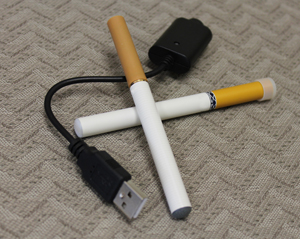 New Brunswick, N.J. – As the prevalence of electronic cigarettes (e-cigarettes) continues to grow, research from investigators at Rutgers Cancer Institute of New Jersey and Rutgers School of Public Health shows more defined survey measurements are needed to better identify established users.
New Brunswick, N.J. – As the prevalence of electronic cigarettes (e-cigarettes) continues to grow, research from investigators at Rutgers Cancer Institute of New Jersey and Rutgers School of Public Health shows more defined survey measurements are needed to better identify established users.
Shaped like a traditional cigarette, these battery-operated devices emit a nicotine vapor that could also contain flavorings. Another form of e-cigarette is a vaporizer type, which functions similar to an e-cigarette but allows users to add their own nicotine-containing liquid to the device. Not many nationally-representative studies exist regarding e-cigarette use in the United States. The few surveys that have been conducted define ‘current use’ as any use of the product in the past 30 days.
“That measurement doesn’t paint a clear picture,” notes senior author Cristine Delnevo, PhD, MPH, co-leader of the Cancer Prevention and Control Program at the Cancer Institute, who also is the director for the Center for Tobacco Studies at the School of Public Health. “Under this form of assessment, any use during the past 30 days could constitute the person who experiments with the device just one time and decides not to do so again. These individuals are being counted with those who may use e-cigarettes several times a week or even daily.”
Dr. Delnevo and colleagues took a closer look at patterns in e-cigarette use and how this use is measured. Their research, which appears in the current online edition of American Journal of Preventive Medicine (http://dx.doi.org/10.1016/j.amepre.2014.04.009), examined the prevalence of ever use, current use, and a newly created category of established use. The team used nationally representative data from a 2013 web survey that captured 2,136 current and former smokers who had quit within the past five years of being surveyed.
‘Ever use’ comprised those participants who responded that they have tried e-cigarettes – even once. ‘Current users’ were considered those who gave a number greater than zero when reporting how many days they used e-cigarettes within the past 30 days. Those who responded to using e-cigarettes more than 50 times in their life and at least once in the past 30 days were considered ‘established users.’ Information on gender, age, education, race/ethnicity, census region and cigarette smoking status also was captured, as was type of e-cigarette used, where those devices were purchased and the price of cigarette taxes in the user’s state.
Overall, researchers found that ever use of e-cigarettes is highest among current every day smokers (49.6 percent) as compared to former smokers (38.3 percent), but former smokers are significantly more likely to be established users of e-cigarettes (8.3 percent) as compared to current every day smokers (2.8 percent). “This could suggest that some smokers have successfully used e-cigarettes to quit, but future studies are needed to further investigate this relationship,” notes lead author Daniel P. Giovenco, MPH, CHES, of the Center for Tobacco Studies. The study further found that younger individuals and those living in states with a higher cigarette tax were associated with higher rates of trial or experimentation but not with current and established use.
“These findings highlight the importance of delineating experimental or ever use – from adoption or established use,” adds Delnevo, who is also a professor and chair of health education/behavioral science at the School of Public Health. “As the U.S. Food and Drug Administration seeks to extend its regulatory authority over e-cigarettes, it will be important for research to answer questions about whether or not e-cigarettes can help cigarette smokers quit combusted tobacco use. With that, better identification of individuals who sustain e-cigarette use is needed, as labeling those who have tried the device even once as an ‘established’ user is misleading.”
The authors note there were limitations to the study including the restriction to current and former smokers and the small sample size of established e-cigarette users. They also indicate any future studies may want to address increasing the usage threshold that would identify an established user.
Along with Delnevo and Giovenco, the author team consists of M. Jane Lewis from the School of Public Health. The research was supported by the National Cancer Institute (R21CA155956 and R21CA159160).
About Rutgers Cancer Institute of New Jersey
Rutgers Cancer Institute of New Jersey (www.cinj.org) is the state’s first and only National Cancer Institute-designated Comprehensive Cancer Center. As part of Rutgers, The State University of New Jersey, the Cancer Institute of New Jersey is dedicated to improving the detection, treatment and care of patients with cancer, and to serving as an education resource for cancer prevention. Physician-scientists at the Cancer Institute engage in translational research, transforming their laboratory discoveries into clinical practice, quite literally bringing research to life. To make a tax-deductible gift to support the Cancer Institute of New Jersey, call 732-235-8614 or visit www.cinj.org/giving. Follow us on Facebook at www.facebook.com/TheCINJ.
The Cancer Institute of New Jersey Network is comprised of hospitals throughout the state and provides the highest quality cancer care and rapid dissemination of important discoveries into the community. Flagship Hospital: Robert Wood Johnson University Hospital. System Partner: Meridian Health (Jersey Shore University Medical Center, Ocean Medical Center, Riverview Medical Center, Southern Ocean Medical Center, and Bayshore Community Hospital). Major Clinical Research Affiliate Hospitals: Carol G. Simon Cancer Center at Morristown Medical Center, Carol G. Simon Cancer Center at Overlook Medical Center, and Cooper University Hospital. Affiliate Hospitals: JFK Medical Center, Robert Wood Johnson University Hospital Hamilton (CINJ Hamilton), Shore Medical Center, Somerset Medical Center, The University Hospital and University Medical Center of Princeton at Plainsboro.

